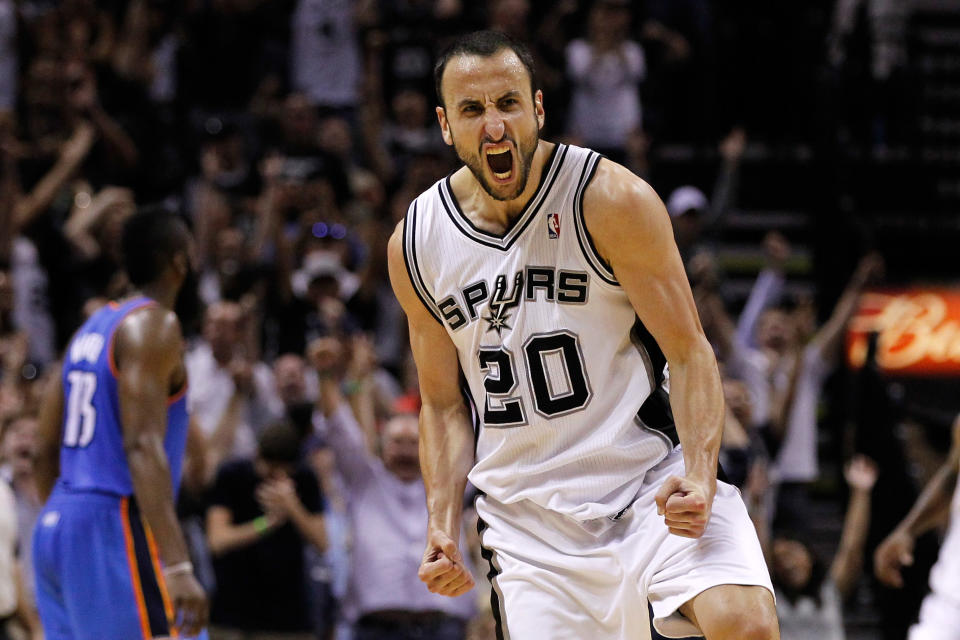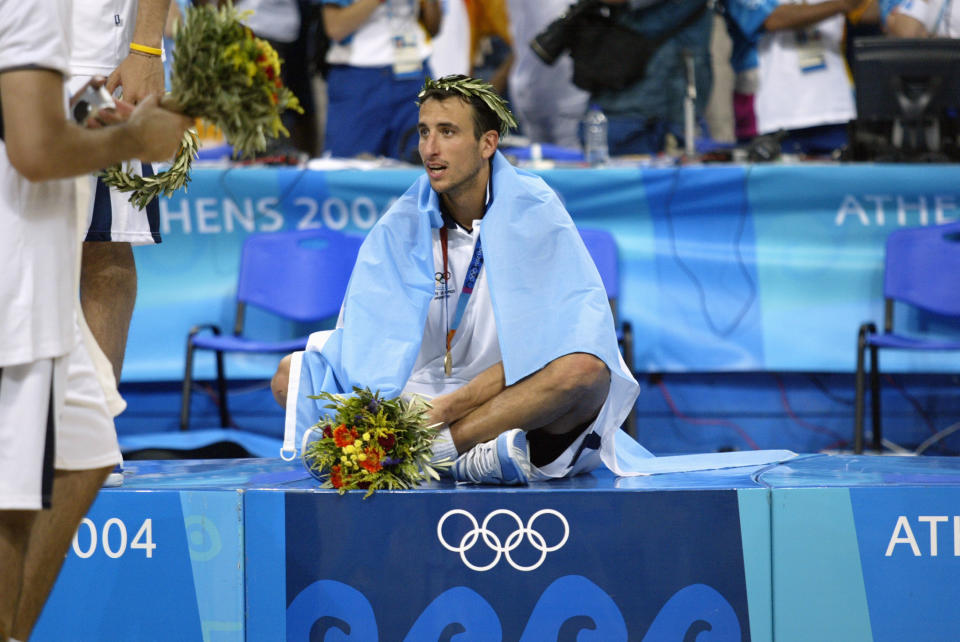Manu Ginobili announces his retirement from basketball after 16 NBA seasons
The other shoe dropped on Monday afternoon, and the NBA’s all the worse for it. A week after reports circulated that he was “seriously considering” walking away from the game, longtime San Antonio Spurs star Manu Ginobili made it official: he’s retiring from professional basketball after a brilliant 23-year career for club and country that will land him in the Naismith Memorial Basketball Hall of Fame just as soon as he’s eligible for enshrinement.
“Today, with a wide range of feelings, I’m announcing my retirement from basketball,” Ginobili wrote in a tweet making his announcement. “IMMENSE GRATITUDE to everyone (family, friends, teammates, coaches, staff, fans) involved in my life in the last 23 years. It’s been a fabulous journey. Way beyond my wildest dreams.”

Ginobili retires at age 41, 23 years after first suiting up for Andino Sport Club in his native Argentina, 19 years after the Spurs plucked him with the 57th overall pick in the 1999 NBA draft, and 16 years after he left the EuroLeague to make his stateside debut. Before coming to the NBA, he starred for Italy’s Virtus Bologna, twice earning MVP honors in the Italian League, once being named the EuroLeague’s most valuable player, and leading his team to the 2001 EuroLeague Championship.
After arriving in San Antonio, the dynamic 6-foot-6 guard played an integral role in four NBA championship runs for the Spurs. He earned two All-NBA selections and two All-Star berths despite coming off the bench for nearly all of his NBA career, and was named the NBA’s 2007-08 Sixth Man of the Year in recognition of his ability to change the game whenever he entered it. Spurs coach Gregg Popovich and general manager R.C. Buford have long raved about the unparalleled unselfishness that Ginobili — a bona fide international star — showed in accepting a reserve role for the good of the team, and in how that helped set the table for establishing so much else about the way the Spurs operate.
“He played as big a part as Tim [Duncan] in building our culture,” Buford told ESPN’s Zach Lowe in 2016. “When Manu Ginobili comes off the bench, it’s hard for anyone to bitch about why they aren’t starting, or whatever role they are in. Look at that guy, then talk to me.”
Ginobili ends his career having averaged averaging 13.3 points, 3.8 assists, 3.5 rebounds and 1.32 steals in 25.4 minutes per game over 16 seasons in Texas, and ranks as the Spurs’ all-time leader in 3-pointers made and steals. (He’s also third in Spurs history in games played, fourth in assists, fourth in free throws made and fifth in points scored.) His averages and counting stats never fully told the story of his impact, though; pro-rate his production out to per-36-minute numbers, and the company Manu keeps includes names like LeBron James, Oscar Robertson, Jerry West, Magic Johnson, Larry Bird, Rick Barry and Bob Cousy. Then, you start to get the picture.
Ginobili played 1,057 career regular-season games as a Spur. In those games, San Antonio posted a winning percentage of .721 (762-295), the highest such percentage in NBA history among players to appear in at least 1,000 games, according to the Spurs. Ginobili impacted winning in a way few other players of his — or any — generation have matched. Without him on the floor, the Spurs were still very good; with him, they became great.
We have plus-minus since 1996-97. Manu ranks 4th over those 22 seasons, having played ~60% the amount of minutes played by the top 3. pic.twitter.com/kaEbkHtUlx
— John Schuhmann (@johnschuhmann) August 27, 2018
Together with Duncan, Popovich and Tony Parker, Ginobili defined an era of Spurs basketball: professional, effective, efficient, and wildly successful. But while Duncan’s metronomic consistency and Popovich’s taciturn demeanor tend to be the first things you think about when you consider San Antonio’s tremendous streaks of playoff appearances, 50-win seasons and overall success over the past two decades, it was Ginobili who gave the Spurs a special spark.
#GraciasManu por todo! pic.twitter.com/8252qgCmvi
— San Antonio Spurs (@spurs) August 27, 2018
In stark contrast with the staid nature of those early-aughts Spurs — all slow-paced, pound-it-into-the-post offense, suffocating defense, low possession counts and high win totals — Ginobili was the splash of color, a neon highlighter with a flowing mop, always daring, always gambling, always seeing what others couldn’t. At every opportunity, he was willing to burst through the sliver of space a defense afforded; when they offered none, he’d create some, thanks to his preternatural playmaking gifts in the pick-and-roll or in transition.
“You realized there was more positive than negative,” Popovich told Lowe in 2016. “He’s a freaking winner. I came to the conclusion that it had to be more his way than my way.”
It’s probably not a stretch to say that without Ginobili’s irrepressible game, and without Popovich recognizing that down that path lay something special, we probably never get the 2014 “Beautiful Game” Spurs, who produced some of the most purely ecstatic ball the league has ever seen:
There’s some poetry to that: to Ginobili’s penchant for pell-mell drives, wild 50-foot fast-break heaves and blind-faith feeds eventually working its way into Popovich’s heart. The Spurs have long operated by The Stonecutter’s Credo. As it turned out, Pop was the rock. Ginobili was the stonecutter. And after all that hammering — and, come to think of it, “Hammer”-ing — what they found together was the core of one of this generation’s most memorable championship teams.
“I always make sure I touch him before every game, and remember what he’s meant to us over the years and how significant a factor he’s been in our success,” Popovich told SB Nation’s Seerat Sohi in January. “I think I’m probably enjoying it more than ever, because I feel I’m about to lose him.”

As important a star as he was in silver-and-black, Ginobili shined even brighter for the Argentinian national basketball team, headlining his country’s “Golden Generation” through an all-time remarkable of excellence. He led a team full of future NBA players — including Luis Scola, Andres Nocioni, Fabricio Oberto, Carlos Delfino and Walter Herrmann — to a win over the mighty United States at the 2002 FIBA World Championship in Indianapolis, marking the first time since the introduction of NBA players into the U.S. side that someone had beaten the Americans in international competition.
They’d go on to even greater glory two years later, winning gold at the 2004 Summer Olympics in Athens after beating the U.S. again in the semifinals, and becoming the first non-U.S. nation to top the medal stand at the Summer Games since “The Dream Team” marked the start of a new era for Team USA in 1992. The date of that semifinal victory, by the way: Aug. 27, 2004, exactly 14 years ago.

The Argentine squad also notched victories at the 2001 Tournament of the Americas, 2008 FIBA Diamond Ball and 2011 FIBA Americas tournaments, a silver medal at the 2002 FIBA Worlds, and bronze at the 2008 Olympics in Beijing, giving Ginobili a glittering trophy case that makes him one of the most decorated and respected competitors in FIBA history. Only two players ever have won a EuroLeague title, an NBA title and an Olympic gold medal: Ginobili and Bill Bradley.
Even after all the miles that 23 pro seasons and nearly two decades of national-team duty put on his body, Ginobili was still capable of helping the Spurs last season. He remained a productive ball-handler and facilitator off the bench in whose minutes San Antonio scored 3.4 more points per 100 possessions than when he was off the floor, according to NBA.com’s stat tool. In the postseason, with the Spurs drawing dead against a vastly superior Golden State Warriors team and facing elimination in the first round, Ginobili dug deep and showed out, scoring 16 points with five assists and three rebounds in Game 4 to extend the series before chipping in 10 points, seven assists and five boards in the eventual Game 5 defeat.
He couldn’t play big minutes anymore, but Ginobili could make not only plays, but moments — turn-back-the-clock drives, no-look feeds, seeing-eye dimes that left you slack-jawed as you tracked their path from his hand through traffic to their destination — that enraptured San Antonio’s fans. After a summer that saw the disappointing end to the hoped-for Kawhi Leonard era, Parker saying goodbye to Texas and the onset of an uncertain future, Spurs fans could’ve some more of Manu’s brand of magic this season.
But Ginobili told reporters in April that his decision would come down to “a matter [of] if I see myself as an ex-player or not.” After weighing it all, he decided that, for the first time in his life, he finally saw himself that way. And so, one of the greatest and most singular talents in the history of basketball moves on.
“When I was a kid, I didn’t even dream of playing in the NBA,” Ginobili told Adrian Wojnarowski back in 2012. “Nobody ever from Argentina played in the NBA when I was 10. I was watching [Michael Jordan’s] tapes and thinking he was from another planet, that he was unreachable, untouchable — the same as Magic [Johnson] and Larry [Bird]. And then I find myself, years later, raising the same trophy as they did.”
That idea — bringing the unreachable and untouchable into range, in defiance of the laws of history and physics — seems about as good a way as any to frame Ginobili’s legacy. On the court, he could make the impossible tangible. Off the court, he helped show entire countries’ worth of young players that they could reach the absolute highest levels of the sport, and that they could not only hang with the U.S., but actually take them down and become the best in the world.
All the while, win or lose, he radiated both competitive fervor and unbridled joy in the way he played. His style and substance connected with people, making him a legend in Bahia Blanca and San Antonio and everywhere else they love basketball. We won’t see Manu Ginobili play again, but we’ll still see the difference he made in every Eurostep, every optical-illusion dish in transition, every bit of “wild colt crazy s***” a player tries out that doesn’t seem like it should work but somehow does. We’ll never stop seeing what he made, now. We’ll never stop seeing how he changed the sport, forever, and for the better.
Spurs fans salute Manu Ginobili with standing ovation and chants of his name pic.twitter.com/E0X3gwzRTd
— Ben Golliver (@BenGolliver) May 23, 2017
– – – – – – –
Dan Devine is a writer and editor for Yahoo Sports. Have a tip? Email him at devine@yahoosports.com or follow him on Twitter!

 Yahoo Sport
Yahoo Sport 






































